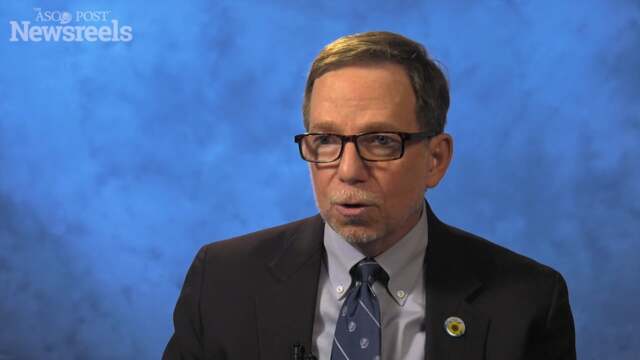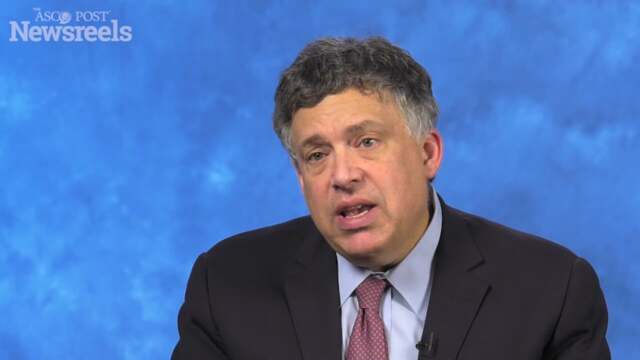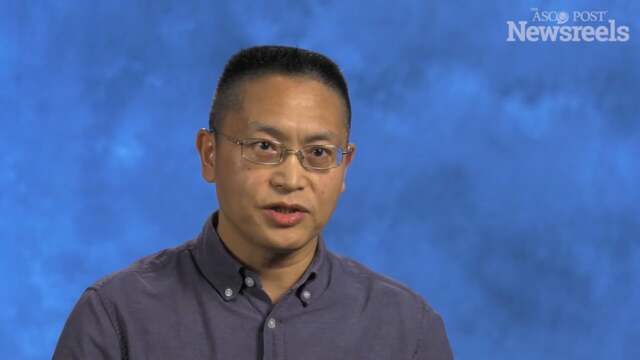Maximilian Diehn, MD, PhD, on Liquid Biopsies/Cell-Free DNA: Clinical Uses
Maximilian Diehn, MD, PhD, of Stanford School of Medicine, discusses promising clinical applications of circulating tumor DNA in patients with thoracic malignancies: noninvasive detection of resistance mechanisms to targeted agents and treatment response assessment.
Shraddha M. Dalwadi, MBA, on Stage I NSCLC: Racial Disparities in Treatment and Outcome
Shraddha M. Dalwadi, MBA, MD Candidate in the class of 2017 at Texas A&M Health Science Center, discusses findings from a SEER database study that showed African Americans and American Indians with stage I non–small cell lung cancer were less likely to receive definitive treatment and had lower odds for survival (Abstract 9).
Richard J. Cassidy III, MD, on NSCLC and SBRT in Older Patients
Richard J. Cassidy III, MD, of Emory Winship Cancer Institute, discusses results from a multicenter analysis of stereotactic body radiotherapy for early-stage non-small cell lung cancer in patients 80 years and older; the patients tolerated the treatment well and had excellent estimated rates of 5-year cancer-specific survival (Abstract 111).
Kamran Ahmed, MD, on Lung Cancer, Radiation, and Immune Checkpoint Inhibitors
Kamran Ahmed, MD, of the H. Lee Moffitt Cancer Center and Research Institute, discusses results from a small study of pneumonitis in patients who received thoracic radiotherapy within 6 months of anti–PD-1 therapy, anti–PD-L1 therapy, anti–CTLA-4 therapy, or some combination of these drugs (Abstract 10).
Thoracic 2017: Combination of Radiation and Immune Checkpoint Therapy Holds Potential for Lung Cancer
An emerging approach for cancer treatment seeks to combine radiation therapy with immune checkpoint inhibitors to more effectively control tumors in the chest with an acceptable risk of severe treatment-related side effects. About 10% of patients in a retrospective analysis of metastatic lung...
Thoracic 2017: Racial Disparities Persist in Treatment and Survival of Early-Stage Lung Cancer
Analysis of the largest American cancer database indicates that racial disparities persist in the treatment and outcomes of patients diagnosed with stage I non–small cell lung cancer (NSCLC). Despite increased availability of potentially curative treatments for early-stage NSCLC,...
Thoracic 2017: Proton Therapy Offers New Treatment Possibility for Recurrent Lung Cancer
A new study offers hope for patients with recurrent lung cancer, who historically have been considered ineligible for curative treatment. In the largest analysis to date of reirradiation using intensity-modulated proton therapy for lung and other thoracic tumors, more than three-fourths of patients ...
Thoracic 2017: Genetic Profile of Treatment-Resistant Lung Cancer More Variable Than Previously Thought
The genetic mutations underlying treatment resistance in non–small cell lung cancer (NSCLC) are more complex and dynamic than previously thought. Analysis of 355 biopsied tumors from patients who acquired resistance to epidermal growth factor receptor (EGFR) inhibitors, the most common form...
Thoracic 2017: Biomarker Test Shows Cancer Recurrence Months Before CT Scans
Results from a prospective clinical trial showed that a blood test looking at specific biomarkers was able to detect recurrences of lung cancer an average of 6 months before conventional imaging methods found evidence of recurrence. In the largest prospective clinical trial to date of circulating...
UK Trial Shows No Survival Benefit in Adding Pravastatin to Standard Chemotherapy in Small Cell Lung Cancer
In the UK phase III LUNGSTAR study reported in the Journal of Clinical Oncology, Seckl et al found that adding pravastatin to first-line standard chemotherapy did not improve overall survival in patients with small cell lung cancer (SCLC). Numerous large prospective cohort and registry studies...
Study Identifies How Cancer Cells May Develop Resistance to FGFR Inhibitors
A new study by researchers at The Ohio State University Comprehensive Cancer Center–Arthur G. James Cancer Hospital and Richard J. Solove Research Institute (OSUCCC– James) has identified a mechanism by which cancer cells develop resistance to a class of drugs called fibroblast growth...
Osimertinib in EGFR Inhibitor–Pretreated T790M-Positive Advanced NSCLC
In the phase II extension component of the phase I/II AURA trial, reported by Yang et al in the Journal of Clinical Oncology, osimertinib (Tagrisso) was found to be highly active in epidermal growth factor receptor (EGFR) tyrosine kinase inhibitor–pretreated T790M-positive advanced...
Immunotherapy Challenges in Lung Cancer: From Patient Selection to Clinical and Financial Toxicity
Immunotherapy has been a major advance in lung cancer, but it is not without its challenges, according to Sanjay Popat, PhD, FRCP, a consultant medical oncologist and reader in cancer medicine at the Royal Marsden Hospital, London, UK. He reviewed some of the challenges pertaining to the use of...
Expert Point of View: David R. Gandara, MD
“With the negative results of this phase III trial and the discontinuation of ganetespib development, is this the end for this once promising drug class in non–small cell lung cancer (NSCLC), or is there still an opportunity for heat shock protein (Hsp) inhibitors to make a meaningful impact?”...
No Improvement in Overall Survival With Addition of Ganetespib to Docetaxel in Patients With Non–Small Cell Lung Cancer
Despite positive results in the phase II GALAXY-1 study, the addition of ganetespib to docetaxel in the phase III GALAXY-2 study did not improve overall survival or progression-free survival in patients with advanced non–small cell lung cancer (NSCLC), according to data presented by Rathi Pillai,...
A Decade of Lessons Learned From EGFR-Targeted Therapy
To summarize the lessons learned from the development of epidermal growth factor receptor (EGFR)-targeted therapy, one only has to go back about 10 years, according to Frances A. Shepherd, MD, Scott Taylor Chair in Lung Cancer Research at Princess Margaret Cancer Centre and Professor of Medicine at ...
Expert Point of View: David Planchard, MD, PhD, Luboš Petruželka, MD, PhD, and Clarissa Baldotto, MD, MSc
Three invited discussants explored the results of these recent immunotherapy studies in lung cancer as well as their potential clinical implications at the International Association for the Study of Lung Cancer 17th World Conference on Lung Cancer. KEYNOTE-021 trial “Pembrolizumab (Keytruda) is...
Immunotherapy Combinations Gain Traction in Lung Cancer
Combining immunotherapies with each other or with other agents such as chemotherapy and growth factor inhibitors holds promise for better tapping their benefit in patients with lung cancer, data from several studies suggest. Results show that strategic combinations can achieve higher response...
ASCO Quality Care 2017: Cost and Survival Analysis Before and After Implementation of Clinical Pathways for Patients With Stage IV NSCLC
In a study reported at the 2017 Quality Care Symposium by Zheng et al (Abstract 3) and published in the Journal of Oncology Practice by Jackman et al, researchers explored the use of clinical pathways to support clinical decision-making and manage resources for patients with late-stage...
Thomas J. Smith, MD, on Oral Abstract Session B (2017 Quality Care Symposium)
Thomas J. Smith, MD, of the Sidney Kimmel Comprehensive Cancer Center at Johns Hopkins, summarizes two papers for which he was a discussant: reducing overuse of colony-stimulating factors without compromising the safety of patients with lung cancer receiving chemotherapy, and a cost-and-survival analysis before and after implementing Dana-Farber Clinical Pathways for patients with stage IV non–small cell lung cancer (Abstracts 3, 52).
Roy S. Herbst, MD, PhD, on Lung Cancer With Immune Checkpoints: Promising Combinations
Roy S. Herbst, MD, PhD, of the Yale Cancer Center, discusses immunotherapy as a standard of care in lung cancer, critical biomarkers, and scientifically guided combination treatment, which will be the future of lung cancer immunotherapy.
Limo Chen, PhD, on Lung Cancer and CD38: Resistance to Immunotherapy
Limo Chen, PhD, of The University of Texas MD Anderson Cancer Center, discusses co-inhibition of CD38 and PD-L1, which leads to improved antitumor immune response, reducing tumor growth and metastasis. (Abstract 79)
Bright Future for Osimertinib in EGFR T790M–Positive Lung Cancer
The AURA3 study—reported by Mok and colleagues and reviewed in this issue of The ASCO Post—confirms the dramatic activity of osimertinib (Tagrisso) in patients with advanced epidermal growth factor receptor (EGFR)-mutant non–small cell lung cancer (NSCLC) and acquired resistance to prior EGFR...
Osimertinib Improves Progression-Free Survival vs Platinum/Pemetrexed in EGFR T790M–Positive NSCLC
In the phase III AURA3 trial reported in The New England Journal of Medicine by Tony S. Mok, MD, of the Chinese University of Hong Kong, and colleagues, osimertinib (Tagrisso) significantly improved progression-free survival vs platinum/pemetrexed (Alimta) among patients with epidermal growth...
Continuing Education Information
This CE/CME/CU-accredited supplement is jointly provided by: To earn credit/contact hours, you must read all the articles in this supplement and then go to https://education.annenberg.net/IASLC Release date: February 25, 2017 Expiration date: February 25, 2018Annenberg Center for Health...
Three Assays and Several Laboratory-Developed Tests Highly Concordant Across Platforms in PD-L1 Immunohistochemistry Testing for NSCLC
Programmed cell death ligand 1 (PD-L1) expression assessed by immunohistochemistry in formalin-fixed, paraffin-embedded tumor tissues is currently the main predictive biomarker for the benefit of anti–programmed cell death protein 1 (PD-1) and anti–PD-L1 agents in patients with non–small cell lung ...
New Lung Cancer Staging Manual Set to Modify Clinical Practice
A revised tumor classification based on 70,967 evaluable patients with non–small cell lung cancer (NSCLC) and 6,189 patients with small cell lung cancer is now available to lung cancer specialists around the world in the form of the 8th edition of the tumor, node, and metastasis (TNM)...
Expert Point of View: Paul Mitchell, MD
“This is a very important systematic review,” commented invited discussant, Paul Mitchell, MD, Associate Professor at the Olivia Newton-John Cancer and Wellness Centre in Melbourne, Australia. “There are theoretical reasons why programmed cell death ligand 1 (PD-L1) inhibitors might cause less...
Efficacy, Toxicity on a Par for Different Classes of Immune Checkpoint Inhibitors
The two main classes of immune checkpoint inhibitors used to treat non–small cell lung cancer (NSCLC) have essentially the same efficacy and toxicity profiles, according to a systematic review and meta-analysis of 23 trials with a total of 5,899 patients.1 Results showed that about one-fifth of...
Expert Point of View: Leora Horn, MD, MSc
The KEYNOTE-028 results confirm that pembrolizumab (Keytruda) is active in extensive-stage small cell lung cancer (SCLC) and lay to rest safety concerns stemming from the higher risk of paraneoplastic syndromes in this disease, according to invited discussant, Leora Horn, MD, MSc, Clinical...
Durable Responses Reported With Pembrolizumab in Heavily Pretreated Extensive-Stage Small Cell Lung Cancer
The programmed cell death protein 1 (PD-1) inhibitor pembrolizumab (Keytruda) has shown durable antitumor activity in patients with extensive-stage small cell lung cancer (SCLC) that expresses programmed cell death ligand 1 (PD-L1), according to an update of the KEYNOTE-028 trial.1 “Median overall ...
Combination Immunotherapy for Lung Cancer: The Wave of the Future
Increasing experience with immunotherapy for lung cancer in both the lab and the clinic is helping to refine treatment approaches and point the way forward, according to Naiyer Rizvi, MD, Director of both Thoracic Oncology and Immunotherapeutics at Columbia University Medical Center in New York....
Ongoing Phase III Clinical Trials of Immunotherapy in Advanced Non–Small Cell Lung Cancer
The information contained in this Clinical Trials Resource Guide includes actively recruiting clinical studies focused on immunotherapy in lung cancer. All of the studies are listed on the National Institutes of Health website at ClinicalTrials.gov. Study Title: A Randomized, Double-Blind, Phase...
Managing Toxicities Associated With Immunotherapy for Lung Cancer
Understanding, anticipating, and managing the toxicities associated with immunotherapies for lung cancer are key to steps to safely using and achieving the most benefit from these new agents, according to Beth Eaby-Sandy, MSN, CRNP, OCN, a nurse practitioner at the University of Pennsylvania’s...
Expert Point of View: Paul Mitchell, MD
“The progression-free and overall survival curves of CheckMate 057 suggest the presence of two patient populations with respect to nivolumab (Opdivo): a relatively sensitive one and a less sensitive, possibly even resistant, one, according to invited discussant Paul Mitchell, MD, Associate...
New Analysis of CheckMate 057: Search Continues for Predictors of Outcome With Nivolumab
Prognostic factors and tumor expression of programmed cell death ligand 1 (PD-L1) predict early mortality among patients with previously treated nonsquamous advanced non–small cell lung cancer (NSCLC) who receive nivolumab instead of docetaxel. But these features are not reliable for excluding...
Expert Point of View: Paul Mitchell, MD
“The KEYNOTE-010 updated survival is looking even more impressive with the benefit of pembrolizumab (Keytruda) over docetaxel. Survival at 2 years with pembrolizumab is more than double that with chemotherapy,” commented invited discussant, Paul Mitchell, MD, Associate Professor at the Olivia...
KEYNOTE-010 Update Shows ‘Striking’ Durability of Second-Line Pembrolizumab in NSCLC
Pembrolizumab’s benefit in previously treated advanced non–small cell lung cancer (NSCLC) that expresses programmed cell death ligand 1 (PD-L1) is long lasting, persisting even after therapy ends, suggests an update of the KEYNOTE-010 trial.1 Initial results of the randomized phase II/III trial,...
Expert Point of View: Michael Boyer, MBBS, PhD
“Taken together, ATLANTIC’s findings show that “durvalumab is active in heavily pretreated patients, and its degree of activity is related to programmed cell death ligand 1 (PD-L1) expression,” commented invited discussant, Michael Boyer, MBBS, PhD, Chief Clinical Officer and Conjoint Chair of...
Durvalumab Shows Activity in Heavily Pretreated Patients With Non–Small Cell Lung Cancer
The immune checkpoint inhibitor durvalumab (also known as MEDI4736) is active and achieves durable responses in patients with heavily pretreated advanced non–small cell lung cancer (NSCLC) that does not have any epidermal growth factor receptor (EGFR) or anaplastic lymphoma kinase (ALK)...
Expert Point of View: Michael Boyer, MBBS, PhD
“The OAK subgroup analyses showed the benefit of atezolizumab (Tecentriq) virtually “across the board,” including among patients with programmed cell death ligand 1 (PD-L1)–negative tumors, remarked invited discussant, Michael Boyer, MBBS, PhD, Chief Clinical Officer and Conjoint Chair of Medical...
Atezolizumab Benefits Survival vs Docetaxel Across Multiple Subtypes of Non–Small Cell Lung Cancer
A wide range of patients with advanced non–small cell lung cancer (NSCLC) see a survival advantage from second- or third-line atezolizumab (Tecentriq) as compared with docetaxel, according to new data from the OAK trial.1 The main results of the randomized phase III trial, previously reported,...
Expert Point of View: Michael Boyer, MBBS, PhD
“This was a very nice analysis using a well-validated group of instruments with high compliance. And this is something that is one of the bugbears of quality-of-life analyses—compliance to completion of the instruments,” commented invited discussant, Michael Boyer, MBBS, PhD, Chief Clinical Officer ...
Quality-of-Life Data From KEYNOTE-024: First-Line Pembrolizumab vs Chemotherapy in Advanced NSCLC
When used as first-line therapy for advanced non–small cell lung cancer (NSCLC), pembrolizumab (Keytruda) yields better health-related quality of life than platinum-based chemotherapy, suggest new data from the randomized phase III KEYNOTE-024 trial.1 After 15 weeks of treatment, changes in scores...
Expert Point of View: Edward B. Garon, MD
“There are several possible ways to move first-line immunotherapy for non–small cell lung cancer (NSCLC) forward, according to invited discussant Edward B. Garon, MD, Director of Thoracic Oncology at the David Geffen School of Medicine at the University of California, Los Angeles. “We could expand...
Clinical Trials Study the Role of Immunotherapy in the First-Line Setting of Non–Small Cell Lung Cancer
In 2016, the KEYNOTE-024 trial set the bar for first-line immunotherapy in non–small cell lung cancer (NSCLC). Trial results showed that pembrolizumab (Keytruda), an antibody to programmed cell death protein 1 (PD-1), reduced the risk of disease progression or death by 50% and the risk of death by...
Understanding the Role of Immunotherapy for Lung Cancer: A Paradigm Shift for the Better
“Immunotherapy for lung cancer is a paradigm shift. I would never have thought when I started my career taking care of lung cancer patients in the mid 1990s that we’d now be substituting chemotherapy with an antibody immunotherapy in 2017. It’s incredible,” commented Roy S. Herbst, MD, PhD, Chief...
Introduction: Immunotherapy for Non–Small Cell Lung Cancer: Advances and Challenges
Lung cancer is the second most commonly diagnosed cancer and the leading cause of cancer-related mortality in the United States, with an estimated 224,390 new cases and 158,080 deaths from the disease in 2016.1 Despite improving survival rates in recent decades, only about 18% of patients are...
Never Smokers Account for Increased Proportion of Non–Small Cell Lung Cancer Cases
In a retrospective study in three U.S. institutions reported in the Journal of the National Cancer Institute, Pelosof et al found that never smokers accounted for an increasing proportion of cases of non–small cell lung cancer (NSCLC) during the period from 1990 to 2013. The study used data...
Gefitinib or Erlotinib vs Chemotherapy in EGFR-Mutant Advanced Non–Small Cell Lung Cancer
In an individual patient data meta-analysis reported in the Journal of the National Cancer Institute, Lee et al found no difference in overall survival for first-line treatment with the first-generation epidermal growth factor receptor (EGFR) tyrosine kinase inhibitors gefitinib (Iressa) or...







